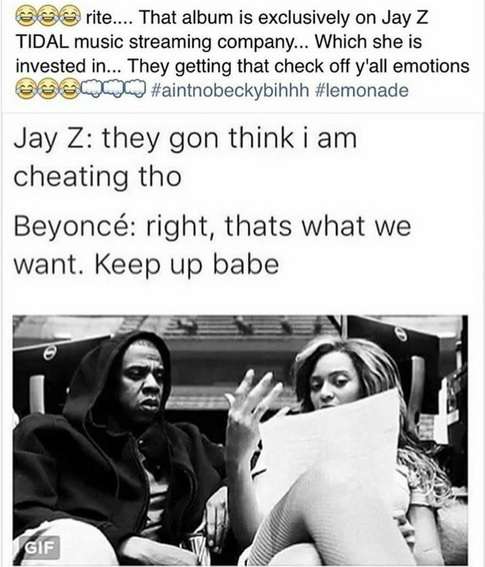Did Jay-Z Cheat on Beyoncé or Do the Two Know How to Sell a Record?
Lemonade and the libertarian moment

The release of Beyoncé's visual album Lemonade this weekend has stirred up a lot of online chatter about references to her husband, Jay-Z, cheating on her.
It's also apparently helped families talk about cheating and, of course, given race baiters an excuse to race bait. Lemonade has made the lemon emoji very popular and will likely boost sales of actual lemonade. (A reference to the Red Lobster chain in an album single released earlier this year contributed to a 33 percent rise in sales over one weekend.)
Lemonade was released first on Tidal, a streaming service owned in part by Jay-Z and Beyoncé and competing against iTunes and Google Music. Tidal is being sued for a promise Kanye West made on Twitter that his latest album, Life of Pablo, would only ever be available on Tidal. It is now available on iTunes and Google Music.
The boon Lemonade will be to Tidal—the album is now available for sale at other services but available to stream only on Tidal—has led some to question whether the infidelity mentioned in the album actually happened. It's reportedly making $3 million a day and could be single-handedly saving Jay-Z's business. Artists create fiction all the time, but the Tidal connection helps illustrate Beyoncé's power in the popular zeitgeist. Depending who you ask she's a feminist, feminist lite, or even anti-feminist. She's a voice for black people or for liberated women or for an entire generation. She's a cultural icon. Above all she's a global brand; she sells—a lot.
She is a product and master of free market capitalism. Rhetoric about not needing 18 kinds of sneakers doesn't leave space for a lot of artistic expression. Who needs Lemonade when there are starving children? All art is ideological and ought to serve the cause of "the people." It's not a caricature—it's the natural conclusion of what Sanders and his ideological fellow-travelers peddle as "democratic socialism."
The triumph of free markets is ultimately in their ability to improve conditions for everyone and creating the space for people to pursue whatever it is they want. The power of socialist ideas, democratic or otherwise, comes from tricking people into ignoring the increase in prosperity around them and where it came from. Albums, and phenomena, like Lemonade help illustrate the wonders of free markets, which operate for and benefit even those who say they don't believe in it.
Memes are the currency of millennials, that hard-to pin down group that says it hates capitalism but loves free enterprise, and I thought of all the memes surrounding Lemonade this one said it all:



Show Comments (128)